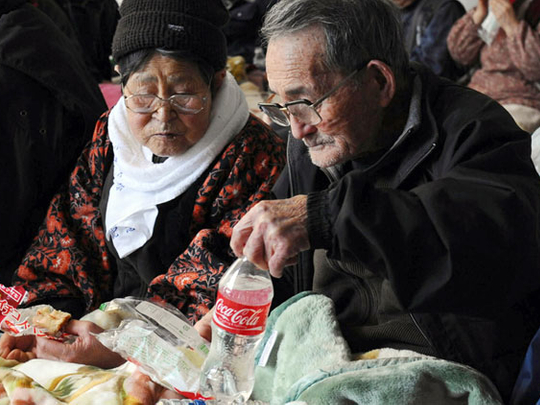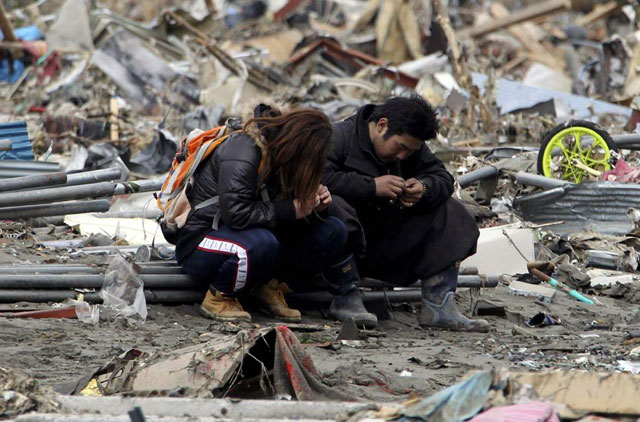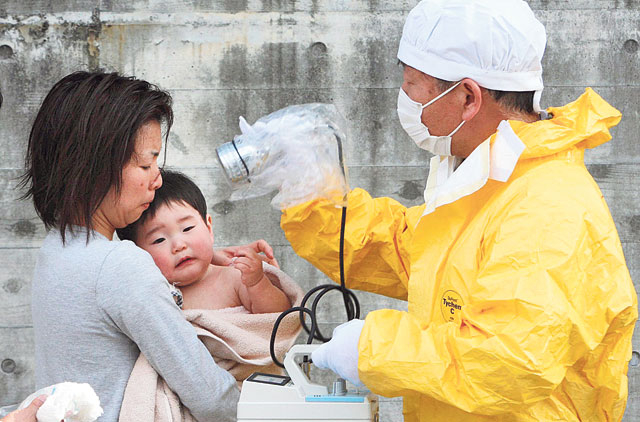
Tokyo: A strong quake was felt late Tuesday in Tokyo, shaking buildings in Japan's capital four days after a massive tremor sparked a devastating tsunami that ravaged the country's northeast coast.
The Japan Meteorological Agency put the magnitude of the quake at 6.0. The epicentre was located in Shizuoka prefecture, about 120kms southwest of the capital, and near Mount Fuji, which is prone to earthquakes. The quake occured at a relatively shallow depth of 10 kilometres.
Radiation levels fell on Tuesday at the quake-stricken nuclear power plant on Japan's northeast coast, the government said.
In pictures: Crisis deepens in quake-hit Japan
Chief Cabinet Secretary Yukio Edano told reporters that the radiation level at the main gate of the Fukushima Daiichi complex, more than 200 km north of Tokyo, was 596.4 microsieverts per hour as of 0630 GMT, down from 11,930 microsieverts at 0000 GMT.
However, jittery Tokyo residents on Tuesday filled outbound trains and rushed to shops to stock up on food, water, face masks and emergency supplies amid fears that radiation was headed their way.
Many were glued to their television sets to follow non-stop coverage of a worsening nuclear emergency at a quake-hit plant just 250 kilometres (155 miles) to the northeast, which has seen four explosions and a fire.
The capital's government said in the morning that higher-than-usual radiation had been detected in Tokyo, but not at levels harmful to human health, and in the afternoon said the radiation had fallen back. But many in Tokyo were not reassured, and at main southern train station of Shinagawa a tense crowd of people, many clutching their children and large suitcases, waited to head south out of the megacity.
Survival kits sold out at department stores while long queues snaked out of supermarkets amid a bout of panic buying, as many Tokyo residents readied for the possibility of having to stay indoors for long periods.
Japan taking right measures to protect people: WHO
Meanwhile, the World Health Organisation said on Tuesday that Japan is taking the right measures to protect its population from radioactivity, including evacuations.
Japan has not asked the WHO to send experts in radiation contamination, but the UN agency's network of experts is on standby, spokesman Gregory Hartl said.
"So far the Japanese have taken all the necessary measures, evacuation, sheltering and prepositioning stocks of potassium iodide," Hartl told Reuters in Geneva.
"These seem to be the public health measures generally agreed upon for the level of exposure that exists at the moment."
Alert spread panic
Panic swept Tokyo on Tuesday after a rise in radioactive levels around an earthquake-hit nuclear power plant north of the city, causing some residents to leave the capital and others to stock up on food and supplies.
Elevated levels of radiation was detected in Japan's capital on Tuesday and around the Fukushima No.1 plant on the eastern coast, it had "risen considerably", Prime Minister Naoto Kan told citizens. His chief spokesman announced the level was now high enough to endanger human health.
The plant is 250 kilometres (155 miles) northeast of Tokyo.
Kan urged people within 30 km (18 miles) of the facility north of Tokyo to remain indoors.
"There has been a fire at the No. 4 reactor and radiation levels in the surrounding area have heightened significantly. The possibility of further radioactive leakage is heightening," a grim-faced Kan said in an address to the nation.
"We are making every effort to prevent the leak from spreading. I know that people are very worried but I would like to ask you to act calmly."
Kan's warning underscored the dramatic worsening of Japan's nuclear crisis, the world's most serious since the Chernobyl disaster in Ukraine in 1986.
The international nuclear agency says a fire at a tsunami-stricken Japanese power plant was at a storage pond for spent nuclear fuel.
The International Atomic Energy Agency says Japanese officials told it that the fire was in the storage pond - a pool where used nuclear fuel is kept cool - and that "radioactivity is being released directly into the atmosphere".
Japanese officials later said the fire, in Unit 4 of the Fukushima Dai-ichi plant, had been extinguished.
Meanwhile, Tokyo was warned from New York: "If you shut down Japan, there could be a global recession".
Travel warnings after Japan's earthquake
Air China has cancelled flights from Beijing and Shanghai to Tokyo.
Several embassies have advised staff and citizens to leave affected areas, tourists have cut short vacations and multinational companies have either urged staff to leave or said they were considering plans to move outside the city.
Fresh blasts hit power plant
Japan's nuclear crisis escalated when two more blasts and a fire rocked a quake-stricken atomic power plant on Tuesday, sending radiation up to dangerous levels.
The French embassy said a radioactive wind could reach Tokyo by the evening.
A fire, which was later reportedly extinguished, was burning in the plant's number-four reactor, meaning that four out of six reactors at the facility are now in trouble.
As well as the atomic emergency, Japan is struggling to cope with the enormity of the damage from Friday's record-breaking quake and the tsunami which raced across vast tracts of its northeast, destroying all before it.
The official death toll has risen to 2,414, police said Tuesday, but officials say at least 10,000 are likely to have perished.
The crisis at the ageing Fukushima plant has escalated daily after Friday's quake and tsunami which knocked out cooling systems.
On Saturday an explosion blew apart the building surrounding the plant's number-one reactor. On Monday, a blast hit the number-three reactor, injuring 11 people and sending plumes of smoke billowing into the sky.
Early on Tuesday a blast hit the number-two reactor. That was followed shortly after by a hydrogen explosion which started a fire at the number-four reactor, which prompted nation-wide alerts.
Chief government spokesman Yukio Edano said radioactive substances were leaked along with the hydrogen.














